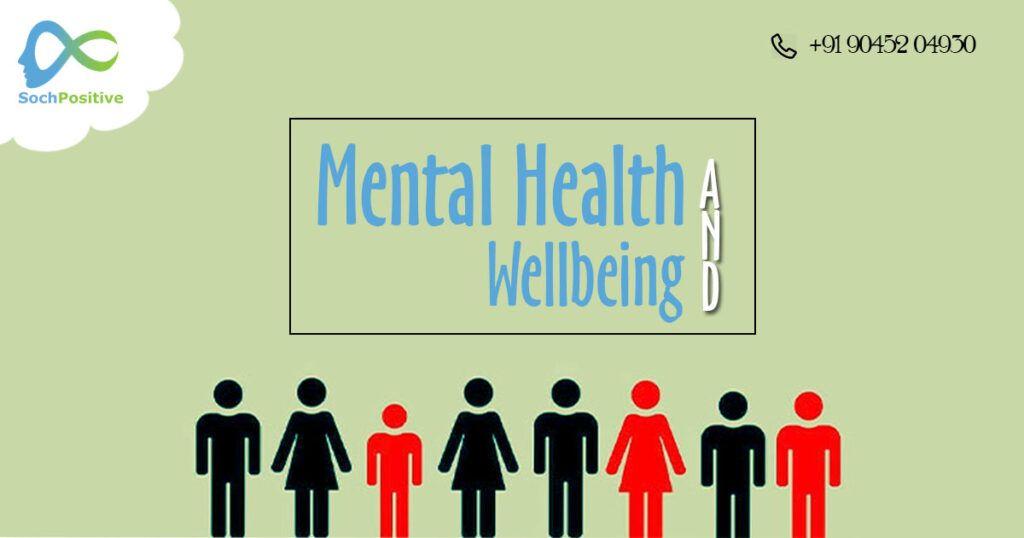Edited by Ms. Shourya Gupta
Mental Health includes our emotional, psychological, and social wellbeing. It affects how we think, feel, and act. Having a good mental health or being mentally healthy, is not just the absence of illness, but it is a state of overall wellbeing. It helps us to determine how we handle stress, relate to others, and make choices in our daily lives.
Mental wellbeing is about your thoughts and feelings and how you cope with the ups and downs of everyday life, how you are able to set and fulfill personal goals and are able to build and maintain relationships with others. If you are able to cope up with the daily challenges of life, it means that your mental wellbeing is intact. However, it is not the same thing as mental health, although the two can influence each other. Long periods of low mental wellbeing can lead to the development of diagnosable mental health conditions such as anxiety or depression.

What influences Mental Health and Wellbeing?
Mental health is influenced by several biological, psychological, social and environmental factors which interact with each other and function. These influences include:
- Biological factors, such as genes or brain functioning
- Life experiences, such as bereavement, trauma or abuse
- Family history of mental health problems
- Structural factors such as safe living environments, employment, education, freedom from discrimination and violence and access to various resources
- Community factors such as a sense of belongingness, community connectedness, social support, and participation in society
- Individual factors such as the ability to manage thoughts and cope with stressors and having communication and social skills to remain connected with others.
- Relationships with others such as having strong connections with friends, family and colleagues
- Physical health, having good nutrition and being physically active
What does good mental wellbeing look like?
Importantly, good mental wellbeing is NOT the absence of negative thoughts and feelings. We all face difficult and challenging situations that cause us to feel angry, sad, overwhelmed. Instead, it is about being able to understand and manage those feelings, so that generally you’re able to:
- Feel confident in yourself
- Build and maintain positive relationships
- Have a sense of purpose in life
- Live and work productively
- Cope with the normal stresses of day-to-day life
- To be able to manage with the changes in life
Signs of Poor Mental Health and Wellbeing
- Eating or sleeping too much or too little
- Having low or no energy
- Inability to perform daily tasks like going to work or school, doing household chores, maintaining personal hygiene
- Staying aloof, avoiding any kind of contact with people around
- Having frequent aches and pains
- Feeling helpless or hopeless
- Smoking, drinking, or using drugs more than usual
- Feeling unusually confused, forgetful, on edge, angry, upset, worried, or scared
- Yelling or fighting unnecessarily with family and friends
- Experiencing severe mood swings
- Poor adjustment in relationships
- Having persistent thoughts and memories you cannot get out of your head
- Hearing voices or believing things that are not true
- Thinking of harming yourself or others
Tips for Positive Mental health and Wellbeing
- Getting enough sleep and rest. Sleep affects our physical and mental health both.
- Taking time out for things you enjoy. Balance in life is important, so taking time out for things you enjoy can make a difference to how you think and feel.
- Be active and eat well. Our physical and mental health are closely linked, so adding exercise and nutritious food every day can make your mental health better.
- Nurture relationships and connect with others. Our connection to others is what builds us up and keeps us strong during the times of adversity.
- Learn new skills, take out time for things you always wanted to learn.
- Invest time in your hobbies.
- Practice mindfulness, it helps in increasing our focus.
- Practice some relaxation techniques in the times of stress.
- Do things that bring you a sense of achievement.
- Take out time to help the needy.
- Set short-term, realistic and achievable goals and deal with one task at a time.
- Staying away from negative coping methods like taking alcohol, smoking, drugs and binge eating.
- Reach out for help when you need it. Everyone needs support from time to time. Talking to a family member, a friend, or taking help from a mental health professional can make all the difference.







